
Author: Ryann Kipping
Thyroid Nutrition
Elderberry
Anemia
Maca

You may have heard of maca recently, the hottest food trend for people on a fertility-boosting journey.
It’s touted to have a multitude of benefits, especially in the reproductive realm. But is maca safe during pregnancy or just another unproven trendy “health’ powder? We’ve got all the details on Maca during pregnancy below.
What is maca?
Maca is a native root plant from Peru. It is a cruciferous vegetable, like broccoli and cauliflower. It is often available in powder form, and many people report the taste as nutty.
There are three types of maca: red, yellow, and black. Different types of maca have different effects: black maca is more effective for men’s sperm production, motility, and semen volume (1).
If you read into the details of maca, it’s traditionally used to enhance fertility and is also said to improve energy and mood (2).
Most individuals who take maca powder blend it in their smoothies daily. However, other uses traditionally have included making it into teas and adding it to oatmeal, soups, and stews (3).
While there isn’t much research on maca during pregnancy, there is some research on maca and fertility. However, the amount of research done with maca, in general, is quite limited and typically uses animals or human males as research subjects or perimenopausal women.
Can Maca help you get pregnant?
Research for maca and fertility outcomes
Regarding women’s fertility, the research is scant and very inconclusive.
Many more studies and evidence support the use of maca for male fertility. Overall, maca has been found to improve semen parameters in men through increased sperm production and motility (3).
No studies have found it to have much effect on women’s hormones before menopause, and even fewer have studied it regarding pregnancy or conception.
Are there other benefits to consuming maca outside of pregnancy?
In minimal studies, maca was thought to potentially be able to support menopausal symptom treatment (4, 5). In one treatment, maca reduced the frequency and severity of individual menopausal symptoms, making it a natural alternative to Hormone Replacement Therapy (HRT) (6). In another study, maca reduced anxiety and depression in postmenopausal women (7).
Though these are not conclusive and research at this time is limited, maca does seem to have positive effects for those in the peri or postmenopausal stages for helping to manage symptoms at these stages.
Is maca safe during pregnancy?
The research needs to be more varied and plentiful.
In short, we don’t know. Since there is no sound scientific evidence or substantiated claim regarding maca consumption during pregnancy, most professionals do not recommend consuming maca or any other unregulated or unknown supplement (8).
We just don’t know if or how it could affect your baby.
Maca nutrition breakdown
1 Tablespoon Maca Powder (x):
- Calories: 30 calories
- Carbohydrates: 6 g
- Sugar: 4 g
- Fat: 0 g
- Protein: 1 g
- Fiber: 2 g
- Potassium: 130 mg
- Calcium: 20 mg
- Iron: 0.4 mg
Are there benefits to consuming maca while pregnant?
Maca is considered an adaptogen, meaning it helps your body adapt to stress. Adaptogens are trendy right now, so it makes sense maca is also part of this conversation.
While it’s fun and exciting, and possibly good for you to incorporate these adaptogens into your diet, again, there is little to no scientific research indicating that they’re safe for pregnant women.
The Botanical Safety Handbook sees “no identified problems for use during pregnancy or breastfeeding” for several adaptogens, including maca (9). However, a lack of evidence does not necessarily signify it is pregnancy safe.
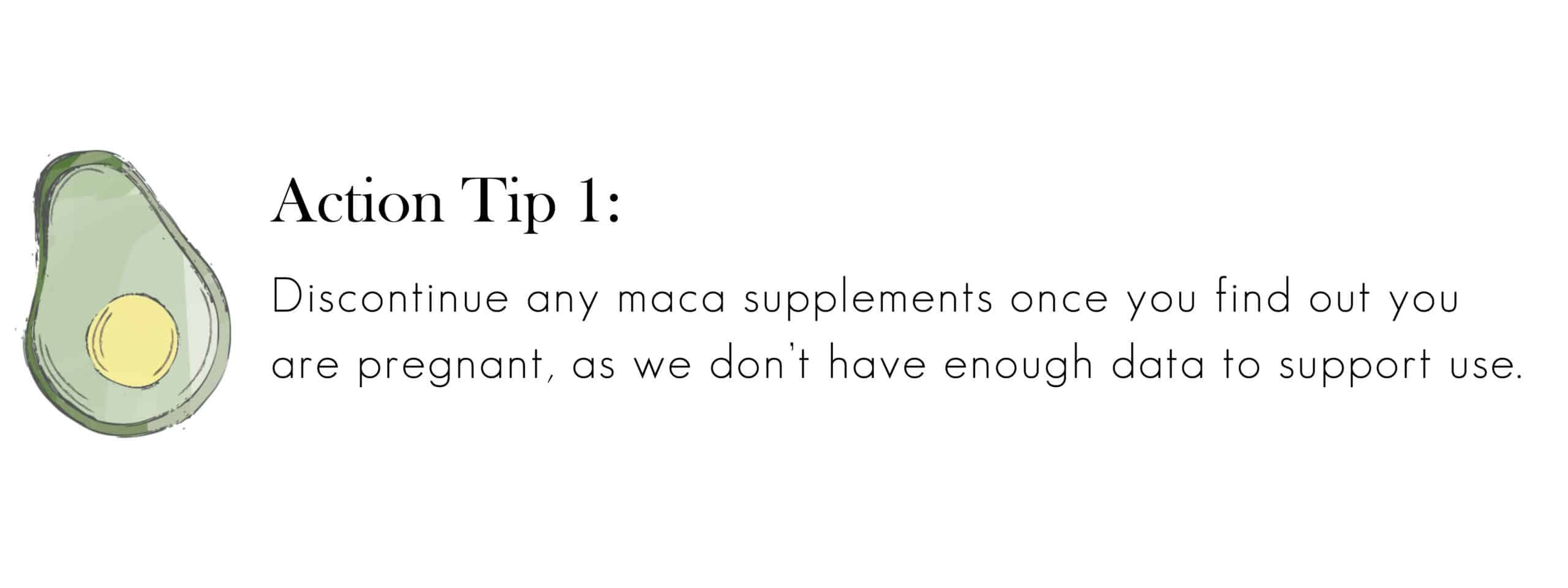 Are there potential side effects?
Are there potential side effects?
According to multiple research sources related to maca consumption, no adverse or toxic levels are reported in animal or human trials.
However, professionals still caution about the utilization and dosage since each individual can react differently.
As previously stated, there is no research on using maca during pregnancy or maca root while pregnant. The potential for adverse side effects or birth outcomes is unknown.
Since we know it can potentially affect hormones, it may be best to avoid it if you have or have had conditions related to hormone imbalances related to estrogens, such as endometriosis, breast cancer, or fibroids, or if any of these runs in your family. It may also be best to avoid maca if you have a thyroid condition (since this impacts your hormones), and talk to a professional knowledgeable about your history and herbs like maca if you want to use it.
Avoid maca if you are currently pregnant or breastfeeding.
If I include maca in my diet, which product should I buy?
If you would like to include maca in your diet while trying to conceive or during postpartum and beyond, here are a few recommendations while shopping for maca and which ones we recommend.
Gelatinized (also known as “activated maca” vs. raw maca: Gelatinisation is a cooking process that helps make maca safer to consume, giving us more potential health benefits from the maca.
While raw maca has some higher amounts of more bioavailable compounds (such as fatty acids and enzymes destroyed during heating), raw maca is much more susceptible to growing mold. It cannot be stored for long periods.
The mold that can grow on raw maca can adversely affect your gut and entire body, and is known to taste sweeter than raw maca. The safest form of maca is commercially called gelatinized or activated maca, which has gone through high-pressure steam to kill the mold and sanitize it.
Due to the removal of the starch, the activated maca powder contains nutrients that are better absorbed and more readily available. One study found that these nutrients were best absorbed in the cooked form in a study observing the growth of mice (10).
In addition to choosing gelatinized maca, choose organic maca to avoid pesticides if possible.
Some Maca recommendations:
How much maca is okay to consume?
Start with 1 teaspoon daily, in tea, smoothie, soup, or yogurt. Consume maca within recommended serving sizes and do not exceed these daily serving recommendations.
The Bottom Line
- Maca has shown some positive effects in studies on women trying to conceive but is more beneficial for men’s fertility overall. Outside of pregnancy, maca can help boost energy and libido and support women in managing their symptoms in the postmenopausal period.
- It is generally not recommended to start any herbal supplement, including maca, while pregnant or breastfeeding and to discuss with your doctor or midwife if you do.
- Overall, the number of studies done and the number of women in the studies are so few that more research needs to be done before it’s safe to say that maca is something that can be incorporated into your and your growing baby’s diet.
- Avoid maca if you have or have had hormone imbalances and conditions related to estrogen in the past or present, such as endometriosis or breast cancer, or if these run in your family. It may also be best to avoid maca if you have a thyroid condition.
- If you are not pregnant and would like to include maca, buy organic, gelatinized maca to reduce the risk of mold and increase nutrient absorption.
Written by: Alessandra D’Orazio, MS, RDN
Reviewed/edited by: Ryann Kipping, MPH, RDN, LDN, and Claire Gilmore, MSCN, CNS, LDN
High Blood Pressure/ Preeclampsia
Spirulina

Spirulina is a supplement that has been around for a long time. You may recall its popularity from the mid-2000s when it seemed everyone was taking it.
There are many purported health benefits, but is spirulina during pregnancy safe? Could it even provide benefits for pregnant women? Let’s take a look.
What is spirulina?
Spirulina comes from blue-green algae, or cyanobacteria, that grows in fresh and saltwater (1).
It’s an extremely popular supplement that’s recognized worldwide as the “ultimate superfood.” Spirulina is reported to increase energy, improve your mood, have potent antioxidants, and potentially help prevent heart disease, non-alcoholic fatty liver disease, and cancer (2, 3, 4).
Spirulina consumption dates back to the Aztecs in the 1400s and 1500s but is said to be more than 3.5 billion years old. The Aztecs would harvest spirulina, dry it, then mix it with other foods they ate (5).
The legend is that emperor Montezuma liked to eat fish and would send his followers hundreds of kilometers away from home to the ocean to catch the fish the emperor liked. And, spirulina was the food that kept them energized for the long haul.
Is spirulina safe during pregnancy?
There is not a lot of research done with spirulina investigating the effects it has on pregnant women, but there are a few articles that touch on the benefits and the risks that we will discuss throughout this article.
Studies in mice are promising, as they tend to show positive effects of spirulina during pregnancy.
In 2012, a study was published that demonstrated protective effects that spirulina’s antioxidants had on a certain type of neural tube defect that can occur in pregnant humans and mice (6).
Another study done in sub-Saharan African women who were pregnant saw an improvement in anemia status when they consumed spirulina in the third trimester of their pregnancies (7).
They actually found that taking spirulina was more effective than taking an iron and folic acid supplement. It was also noted that no adverse side effects were seen when the women took 1500 mg/day of spirulina in tablet form.
In a separate study with rats in 1998, the investigators found a higher iron storage level than that of the control group (8).
The evidence that is available is promising, but most of the studies have been done in mice, with few being completed in humans, especially pregnant women.
Of the studies that were promising, it seems that spirulina was mostly given or taken during the third trimester of pregnancy, which produces the least severe potential birth defects.
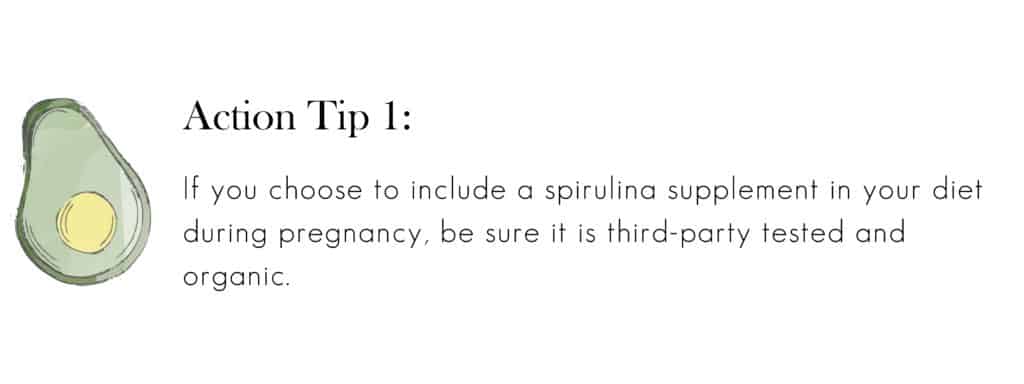
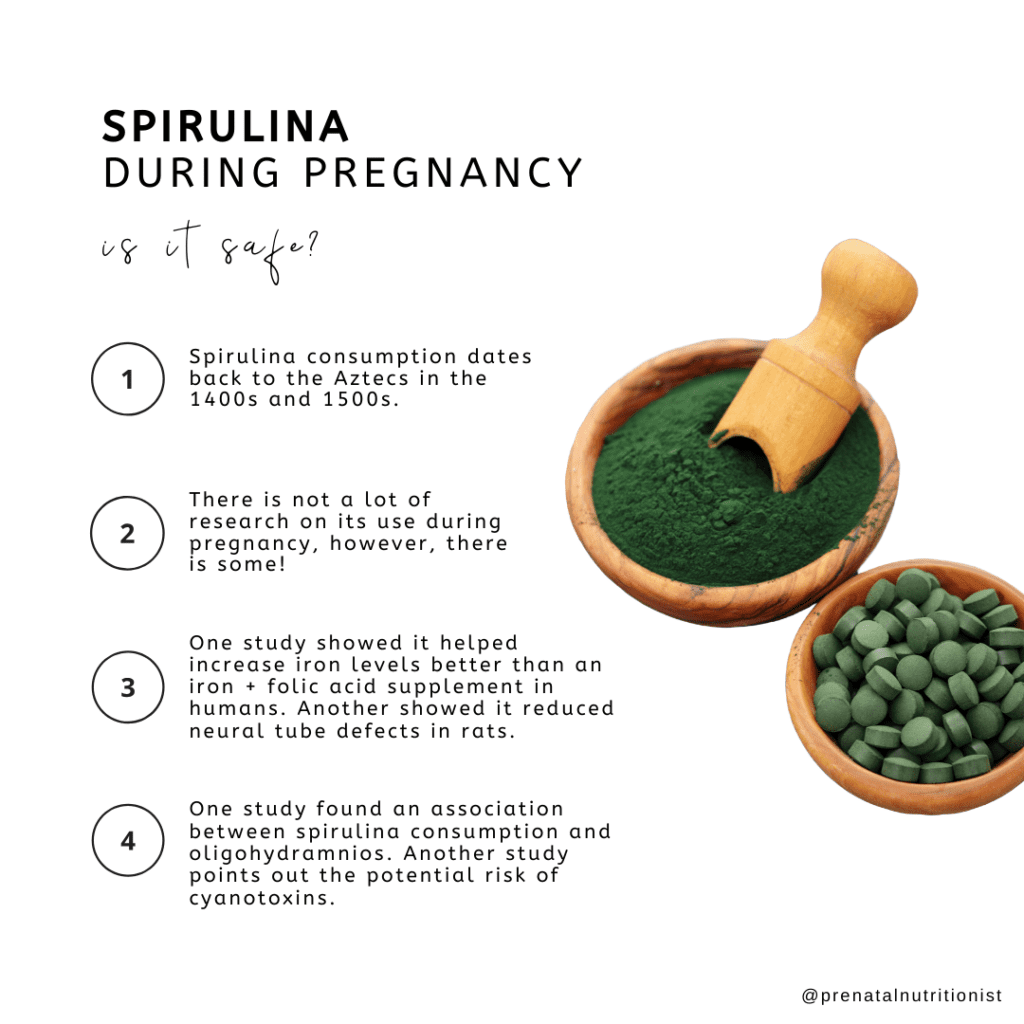
Nutrient breakdown
6 tablets, each 500 mg of spirulina
- Energy: 10 kcal
- Protein: 2 g
- Calcium: 20 mg
- Iron: 1.8 mg
- Sodium: 40 mg
- Vitamin B12: 3.6 ug
- Vitamin A: 7000 IU
All data provided by the USDA nutrient database.
Benefits of spirulina during pregnancy
Antioxidants & anti-inflammatory properties
The main component of spirulina is phycocyanin, which also gives spirulina its blue-green color. Phycocyanin is an antioxidant that helps fight free-radicals and inhibits inflammation.
Other researchers suggest spirulina can protect against oxidative stress and boost our immune system to help prevent many chronic health conditions (9, 4).
Iron
Phycocyanin also contributes to red blood cell production, which makes it popular among research studies to investigate the effects of spirulina (and phycocyanins) on the capabilities of algae during pregnancy and iron level changes.
Your body uses iron to make hemoglobin, which carries oxygenated cells throughout your body. When you are pregnant, you need more iron to accommodate your growing baby, and your growing body (10).
If you do not consume enough iron, then you could be at risk for developing iron-deficiency anemia.
When you have iron-deficiency anemia, you may notice you are fatigued and feel weaker than usual. You may also experience cold hands and feet and pale skin. Severe anemia has the potential to cause premature birth, low birth weight, and postpartum depression (10).
Iron can be found in meat, like chicken and beef, and can also be found in plants, such as cooked spinach and collard greens.
Protein
Two tablespoons of spirulina powder have 6 grams of protein, according to the USDA nutrient database (11).
Protein is vital to consume while you are pregnant. Protein helps your baby grow, especially his or her brain. It also plays a role in expanding your blood supply and growing your breast and uterine tissue.
Protein can be found in plant and animal-based foods, such as fish, chicken and other meats, nuts, peas, and beans.
As a plant-based protein, spirulina can contribute to protein and iron needs for those following a vegetarian diet during pregnancy.
Are there risks to consuming spirulina during pregnancy?
Oligohydramnios
In Malaysia, researchers found an association between women who took spirulina during pregnancy and a lower than normal amniotic fluid volume for gestational age, called oligohydramnios (12).
Amniotic fluid is vital for your baby’s development and can cause birth defects, low birth weight, and miscarriage (13).
Toxin exposure
While spirulina is not likely to harm you, it should be noted that sometimes microcystins can infiltrate this superfood as well as some heavy metals (2, 14).
However, it will make you feel better knowing a study completed in 2013 tested 25 different spirulina products and found that all 25 were within safe limits of toxic load. The most plentiful metals were Zinc and Nickel which are substantially less toxic than other metals like lead and arsenic (14).
Microcystins, on the other hand, cannot be broken down once ingested and can cause serious liver damage (15). A separate study in Montreal in 2016 tested cyanotoxin content of 18 brands and found that 8 contained some level of cyanotoxins, 4 were contaminated with microcystins, specifically (2).
In agreement with the researchers, product quality assurance is important. Find a high-quality product that is third-party tested for purity and potentially organic.
How to include spirulina in your diet
With the potential benefits of spirulina being increased iron levels and an extra punch of protein, you may be interested in taking it as a supplement, which is available as a tablet or powder.
The most popular way to add it to your diet is perhaps in your favorite smoothie, but you can also mix a spoonful into your water and drink it as is.
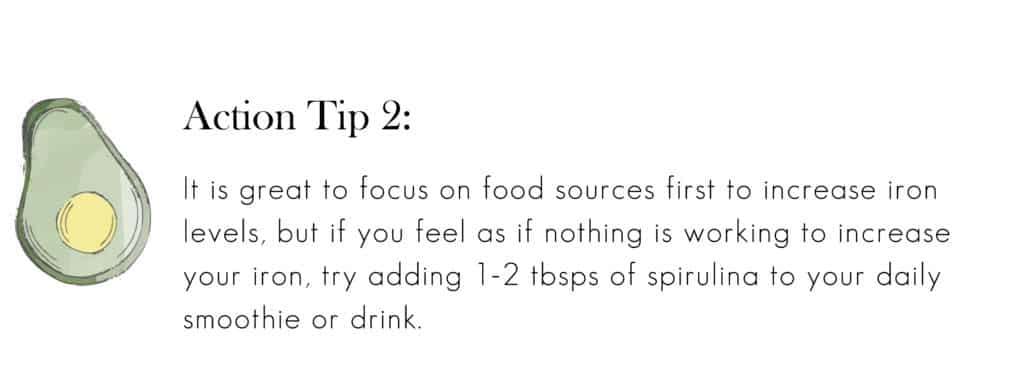
The Bottom Line
- Since the evidence is scant regarding the potential benefits and detriments of consuming spirulina while pregnant, it is best to speak with your doctor or dietitian regarding the safety of its consumption with your unique situation.
- With its promising effects on iron levels, spirulina may be a beneficial choice if you are experiencing anemia. It may also be a good addition to your diet if you are vegetarian.
- Again, be sure to discuss adding spirulina to your diet during pregnancy with your doctor or dietitian to be sure it is safe for you and your growing baby, especially if you are planning to forgo the iron capsule.
- As researchers P B Persson and A Zakrisson say it, spirulina may be an easy, cheap protein source, but people are stretching the truth by labeling it a “superfood” (16).
- Buy spirulina from a reputable brand, or store, that participates in third-party testing. This is the best way to ensure you are receiving a high-quality product that is free of any harmful toxins.
Athlete
Bed Rest
Turmeric
MTHFR Gene Mutation
Prenatal Vitamins
Multiple pregnancy
Protein Powders
Meal Plans
Gestational Diabetes
Green Tea
Celery Juice

This crazy green juice is all the rage right now which means many women are wondering if drinking celery juice during pregnancy is safe. Stores are sold out of celery and home juicing machines are flying off the shelf, but is this a trend you want to indulge in for you and your baby? We are outlining all the details below!
What is it?
While there is nothing new or revolutionary about juicing, it has returned to the spotlight after a popular book and a few popular “medical public figures” have touted it as a miracle juice.
It has taken the world by storm on Instagram as the newest selfie sidekick paired perfectly with a metal straw.
The idea is to juice 3 or more stalks of celery and consume it first thing in the morning before you eat anything else.
Although there isn’t much research backing it, people report changes in their bowel movements, skin, as well as other internal benefits, after starting this daily habit.
Is celery juice safe during pregnancy?
There is no research suggesting celery juice causes harm during pregnancy, but there is also no research suggesting specific benefits during pregnancy.
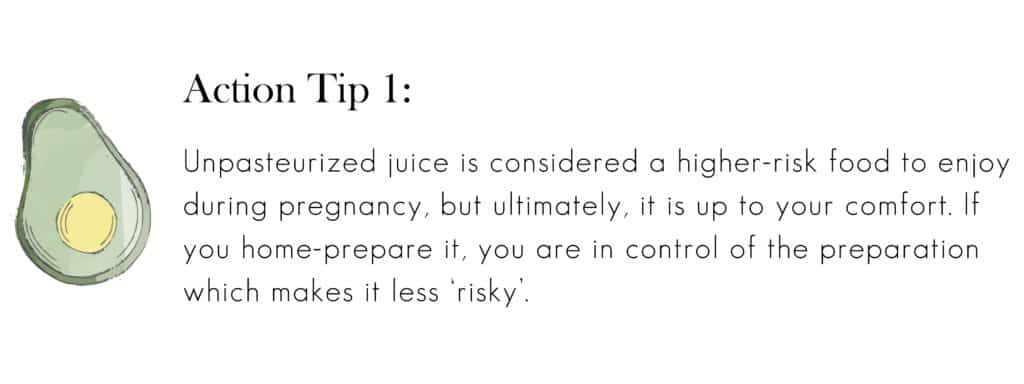
Many pregnant women are told juicing while pregnant is not safe because most fresh juices are not pasteurized. Pasteurization is a heat-treating process that reduces the chance of bacteria growth (1).
If you juice celery at home, it will not be pasteurized. If you do decide to consume home-juiced celery during pregnancy, ensure the celery has been carefully washed prior to juicing it.
Eating whole celery during pregnancy is perfectly safe. Increasing your vegetable intake can help increase micronutrients, prevent constipation, and also plays a role in fetal and infant growth (2).
Eating whole celery versus drinking it is different nutritionally.
Juicing celery requires much more celery than you could eat raw in one sitting with your favorite veggie dip.
A 16-ounce glass of celery juice usually contains around 9 stalks of celery, although you can use less to sip a little green juice.
Due to using a much larger quantity of celery in juice creation, the nutrients you obtain are higher which is appealing to women trying to up their nutrient intake during pregnancy.
Nutrient breakdown; whole celery versus celery juice:
In one large stalk of celery:
- Calories: 9 calories
- Carbohydrates: 1 g
- Sugar: 0.9 g
- Fat: 0 g
- Protein: 0.4 g
- Fiber: 1 g
- Potassium: 166 mg
- Calcium: 25.6 mg
- Sodium: 51 mg
In an 8 oz. glass of celery juice:
About 3-4 large stalks
- Calories: 42 calories
- Carbohydrates: 9 g
- Sugar: 6 g
- Fat: 0 g
- Protein: 2 g
- Fiber: 4 g (with pulp, so if you blend it, not juice it)
- Potassium: 670 mg
- Calcium: 100 mg
- Sodium: 215 mg
All values provided by the USDA nutrient database.
Are there benefits to consuming celery juice during pregnancy?
Celery, raw or juiced, is mainly composed of water, hence it can help keep you hydrated.
It is important to increase fluid intake as your pregnancy progresses because body weight and blood volume are changing rapidly.
People who drink celery juice regularly report increased or better-regulated bowel movements, although not everyone will receive these benefits.
Again, you are likely to see this benefit also from eating whole celery due to the fiber content.
This can be beneficial to pregnant women because a common symptom of pregnancy and taking some prenatal vitamins is constipation.
One study in rats suggests celery seed helps lower blood pressure (3). A study in China showed celery juice specifically reduced blood pressure in 14 of 16 patients (4).
There are no studies showing celery juice affects blood pressure in pregnancy specifically.
 Are there potential side effects?
Are there potential side effects?
As stated above, there is no research suggesting celery juice is harmful in pregnancy, however, there are no specific benefits to consuming celery juice during pregnancy.
Drinking the juice of any fruit or vegetable typically means you will be ingesting more sugar. While this is sugar naturally found in the produce, it still contributes to the rise in your blood sugar.
Secondly, the fiber content is lost when you juice celery.
The fiber in foods helps to keep us full and helps regulate our bowel movements. This is important during pregnancy due to the increased chance of constipation.
Dismissing the fiber in this vegetable would not be utilizing it in its best form. To keep some of the fiber, blend the celery as opposed to juicing it.
 The Bottom Line
The Bottom Line
- Celery and celery juice are generally safe during pregnancy. Remember to wash all produce thoroughly before consuming it.
- While it is recommended that you do not start anything new during pregnancy, increasing your vegetable intake has many benefits and celery juice can contribute to your overall fluid intake.
- If you enjoyed celery juice prior to becoming pregnant, and still find it appealing when pregnant, it is fine to continue including it in your diet.
By Lauren Gannon, RDN, and Ryann Kipping, RDN, CLEC | Owner & Founder
Almond Milk

Non-dairy “milks” are the latest health trend to hit all major grocery stores and your favorite coffee shops, but what about almond milk during pregnancy?
Is adding almond milk to your smoothie the best option for your body and your baby?
Many people make the switch from dairy milk to almond milk because of dietary or allergy concerns, but some who continue to drink dairy milk may just want to add variety to their diet or enjoy it because of the taste or consistency.
Regardless of the reason you drink almond milk, we are covering everything you need to know here.
Is almond milk safe during pregnancy?
There is no research on almond milk during pregnancy as it is still a relatively new product on the market.
Almonds themselves are safe and quite a nutritious option for pregnancy due to their healthy fats, vitamin E and fiber content, but what happens when we turn them into liquid?
To make almond milk, you simply need almonds and water which lends to believe it is safe during pregnancy. However, not all almond milks are created equal.
For consistency, added flavor, and extended shelf-life many beverage companies put various preservatives or food additives in their almond milks. Some of these are completely harmless, but others have shown potentially negative effects.
One particular food additive, carrageenan, is used to thicken, emulsify, and extend the shelf-life of certain products. It is often found in vegan or vegetarian products since it is derived from plants.
A few studies have found a possible link to increased inflammation and gastrointestinal issues with excessive consumption of carrageenan and so, the National Organic Standards Board removed it from the list of approved ingredients (1, 2).
There may also be other “gums” which are used for the same reasons as carrageenan but provide no nutritional value.
At the end of this article, we will discuss what to look for when purchasing almond milk at the store.
Is almond milk good for pregnancy?
As previously stated, there is no research on drinking almond milk during pregnancy.
While almond milk can certainly fit into a healthy prenatal diet, it is important to note cow’s milk and almond milk are nutritionally not the same. In fact, most non-dairy milks do not share the same nutrition properties as cow’s milk (3).
Some almond milks are fortified with nutrients such as vitamin D, vitamin B12, and calcium making it a good choice for those who are allergic or sensitive to cow’s milk.
Fortified or not, almond milk is not a source of protein, iodine, or selenium so ensure you are getting plenty of these three nutrients elsewhere.
Almond milk contains fewer calories, less sugar (if unsweetened), less protein, and fewer nutrients than cow’s milk.
A “lower calorie” food can quickly become appealing, but pregnancy is generally not a time when we want to “count calories” or intentionally choose “low-calorie” foods.
And, although cow’s milk does technically contain more sugar and therefore, more carbohydrates, this is naturally occurring.
Overall, almond milk can fit into a healthy prenatal diet and an unsweetened, potentially fortified option could be perfect for those with a dairy allergy or sensitivity.

Almond milk vs. cow’s milk nutrient breakdown
Replacing all your dairy milk with almond milk is not a direct swap as you can see.
Below are the nutritional values of both dairy milk and almond milk for an 8 oz. or 1 cup serving.
Almond milk, unsweetened, unfortified (4)
- Calories: 37
- Fat: 3 g
- Protein: 1 g
- Carbs: 1 g
- Fiber: < 1 g
- Sugar: < 1 g
- Calcium: 481 mg
- Vitamin D: 0 g
- Vitamin B12: 0 g
- Potassium: 163 mg
- Choline: 0 mg
Whole cow’s milk (5)
- Calories: 149
- Fat: 8 g
- Protein: 8 g
- Carbs: 12 g
- Fiber: 0 g
- Sugar: 12 g
- Calcium: 276 mg
- Vitamin D: 127 IU
- Vitamin B12: 1.1 mcg
- Potassium: 322 mg
- Choline: 35 mg
Dairy from cows naturally provides many nutrients important for pregnancy such as protein, calcium, iodine, vitamin B12, probiotics, and more, so if you aren’t allergic, it is beneficial for you and for the baby during pregnancy.

What about other non-dairy milks during pregnancy?
Soy milk is a popular non-dairy beverage that has been around for ages, but more recently we have seen practically everything be liquified.
Other non-dairy “milks” include:
- Oat milk
- Cashew milk
- Rice milk
- Coconut milk
- Pea milk
- Hemp seed milk
- Flaxseed milk
All of the above are safe to consume during pregnancy, but again contain a wide variety of nutrients likely not equivalent to cow’s milk. Like anything else, moderation is key.
Tips for purchasing almond milk
As stated above, all kinds of milk are not created equal nor are all kinds of almond milk. Below are some things to consider when reviewing almond milk options during your next grocery trip.
- Choose unsweetened varieties to limit added sugar intake
- Choose an organic option, if you can
- Find one with two simple ingredients: almonds and water
- Or, pick one without carrageenan
- If you’re worried about nutrient intake, choose one that’s fortified
Alternatively, you can always make your own almond milk!
There are a number of recipes floating around the internet touting it’s easy and has a delicious flavor.

The Bottom Line
- There is currently no research on almond milk during pregnancy, but due to the nature of the product it is safe to consume in moderation.
- Since almond milk is not equivalent to cow’s milk in the way of nutrients, it is important that you make sure you are getting these nutrients elsewhere in your diet.
- When purchasing almond milk during pregnancy, make sure to avoid added sugars and unnecessary additives such as carrageenan.
By Lauren Gannon, RDN, and Ryann Kipping, RDN, CLEC | Owner & Founder
Juicing

Juicing has gained a lot of popularity in recent years. You may even have a friend or two who’ve done a juice cleanse, and maybe you have too. Now that you’re pregnant, you may be wondering: is juicing during pregnancy safe for me and my baby?
What is juicing?
Juicing involves squeezing (literally) the nutrients out of a fruit or vegetables, or both. The process eliminates all solid matter that was part of the fruit or vegetable. There are many reasons why an individual would juice, with a popular one being to “detox”.
When someone goes on a juice cleanse to detox, it can last anywhere from 3 days to several weeks.
The belief is that the nutrients in the juice will eliminate built-up toxins in the body either by resting your organs, stimulating your liver, improving circulation, or passing them through urine or bowel movements (1).
Is juicing safe during pregnancy?
When you juice, you are eliminating an incredibly important nutrient from your diet, fiber.
During pregnancy, a lot of hormonal changes are happening, and oftentimes that can lead to constipation. Fiber is a great way to get everything moving again, and eliminating it from such a stellar food source is not recommended.
Fiber also lowers your risk for several diseases.
It does this by helping to sweep cholesterol away and out of the body when you have a bowel movement, and by lessening the blood glucose response by your body, which in turn keeps insulin levels lower too (1).
Choosing to participate in a juice cleanse while pregnant is not a good idea.

Your body needs adequate nutrition to fuel your baby’s growth, and doing a juice cleanse will not give you the number of calories or protein that you need to help your baby grow.
Below is the fiber difference between eating an apple versus drinking the juice.
Apple, whole
Fiber: 4.37 g
Apple, juiced
Fiber 0.2 g
All nutrients obtained from the USDA nutrient database.
It’s also important to note you often juice many more pieces of fruit than you would normally eat in one sitting. This results in more sugar consumption. Yes, this is naturally occurring sugar, but it still contributes to the rise in your blood sugar.
For example, to make 8 ounces of orange juice, it takes 4-5 oranges. You could easily drink 1 cup of orange juice, but most of us wouldn’t eat 5 oranges in one sitting.
We will discuss blood sugar and gestational diabetes risk in more detail below.
Are there benefits to juicing during pregnancy?
If you’ve ever had a conversation with someone, or read a blog post by an individual who completed a juice cleanse, then you know they usually swear it works and that they feel better.
When you juice, recipes include whole, fresh fruit and vegetables, which is exactly what the dietitian ordered. It’s a convenient way to get in most, if not all, of your fruit and vegetable servings in a day, as well as vitamins, minerals, and antioxidants.
When you juice, you also tend to avoid processed foods, which is something many people are interested in. That means avoiding dietary sources of heavy metals, and other scary-sounding additives and by-products (2).
While these anecdotal stories are inspiring, and may even convince you to participate in a juice cleanse, there is no sound scientific evidence to support any of what juicing claims to do (3).
The liver, one of the largest organs in our body helps us naturally eliminate potential toxins (4).
Learn more about celery juice during pregnancy, specifically, in a separate note.
Learn more about celery juicing during pregnancy
What about morning sickness?
If you’re having morning sickness, and find it difficult to keep food down, then juicing may be a viable option to help you get some of the nutrients you need for the time being.
Additionally, consider smoothies which also allows you to get a lot of nutrients in one sitting, and can also include plenty of protein to help you reach your daily needs.
Are there downsides to juicing during pregnancy?
Food safety
If you would like to consume a juice every now and then (or one every day to supplement your intake), be sure you are buying pasteurized juices.
By using high heat, the pasteurization process reduces the chances of harmful bacteria contamination, which can hurt your unborn baby and cause permanent abnormalities (5).
If you are home juicing, you will obviously not have access to commercial kitchen equipment to pasteurize your juice. For this reason, it is very important you thoroughly wash all produce prior to juicing it, even fruits that you don’t eat the peel.
Additionally, if you want to be extra cautious, you can bring your juice to a boil for at least one minute prior to consuming it.
If you live in a more “health-conscious” town or a bigger city, there may be juice shops around every block. They may or may not heat treat their juices. Don’t be afraid to ask or inquire about their juicing process.
After making an assessment of their store, food quality, and food safety practices, use your best judgment to make the right decision for you.

High blood sugar
Before buying a juicer or getting a local juice co punch card, it’s important to make sure you are not at risk for gestational diabetes.
Since the fiber from the fruits and vegetables is juiced out, you have nothing left to aid in slowing down how fast your body absorbs the natural sugar, and you’re left with sugary nutrition water – which isn’t problematic for everyone.
To reinforce the importance of fiber, we need to discuss another role of this crucial nutrient. It helps to control the rise in our blood sugar making the sugar in whole fruits less of an issue.
Some studies have found a link between high fruit juice intake and increased risk of diabetes in and outside of pregnancy (6, 7).
Check with your doctor to ensure your blood sugar levels are within a normal range before you consume juices regularly.

The Bottom Line
While juicing can be fun, and create community if you involve your friends, you may want to re-think your juicing decisions, at least until after your baby is born.
Enjoying a pasteurized juice, or a homemade one with adequately washed produce, once in a while will not harm you or your baby, and can give you a vitamin boost.
Check with your doctor or dietitian if you plan to incorporate juices regularly into your prenatal diet.

If you would like to keep the fiber content of your delicious drink high, then consider making a smoothie instead. You still get all of the amazing nutrients that fruit and vegetables have to offer, while not sacrificing the fiber content, and the rest of the solid material.
By Alexa D’ Orazio, MS, RDN and Ryann Kipping, MPH, RDN, CLEC | Owner & Founder


